Howard BLAKE - a survey of his music
on CD
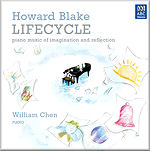 Howard
BLAKE (b. 1938) Lifecycle - 24 pieces for
solo piano.
Howard
BLAKE (b. 1938) Lifecycle - 24 pieces for
solo piano.
 William Chen (piano).
William Chen (piano).
 ABC
CLASSICS 476 118-4 [65.33]
ABC
CLASSICS 476 118-4 [65.33] 
AmazonUK
AmazonUS
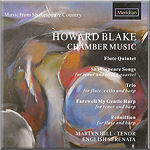 Howard
BLAKE (b. 1938) Flute Quintet; Shakespeare Songs;
Trio for flute, cello and harp; Farewell My Gentle Harp -
for tenor and harp Op.517 (1976 revised 2000) [4:58] Penillion
for flute and harp.
Howard
BLAKE (b. 1938) Flute Quintet; Shakespeare Songs;
Trio for flute, cello and harp; Farewell My Gentle Harp -
for tenor and harp Op.517 (1976 revised 2000) [4:58] Penillion
for flute and harp.
 Martyn Hill (tenor); English Serenata.
Martyn Hill (tenor); English Serenata.
 MERIDIAN CDE84553 [63:44]
MERIDIAN CDE84553 [63:44] 
AmazonUK
AmazonUS
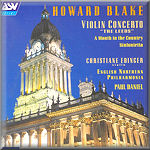 Howard
BLAKE (b. 1938) Violin Concerto The Leeds;
A Month in the Country; Sinfonietta for 10 brass instruments.
Howard
BLAKE (b. 1938) Violin Concerto The Leeds;
A Month in the Country; Sinfonietta for 10 brass instruments.
 Christiane Edinger (violin) English Northern Philharmonia/Paul
Daniel
Christiane Edinger (violin) English Northern Philharmonia/Paul
Daniel
 ASV CD DCA 905 [62:40]
ASV CD DCA 905 [62:40] 
AmazonUK
AmazonUS
review
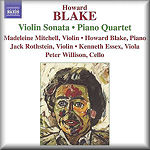 Howard
BLAKE (b. 1938) Violin Sonata; Penillion;
Piano Quartet; Jazz Dances.
Howard
BLAKE (b. 1938) Violin Sonata; Penillion;
Piano Quartet; Jazz Dances.
 Madeleine Mitchell
(violin); Jack Rothstein (violin); Kenneth Essex (viola); Peter
Willison (cello); Howard Blake (piano)
Madeleine Mitchell
(violin); Jack Rothstein (violin); Kenneth Essex (viola); Peter
Willison (cello); Howard Blake (piano)
 NAXOS 8.572083
[74:15]
NAXOS 8.572083
[74:15] 
AmazonUK
AmazonUS
Classicsonline
review
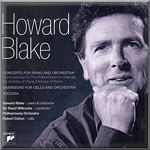 Howard
BLAKE (b. 1938) Piano Concerto; Diversions;
Toccata - A Celebration of the Orchestra.
Howard
BLAKE (b. 1938) Piano Concerto; Diversions;
Toccata - A Celebration of the Orchestra.
 Howard Blake
(piano), Robert Cohen (cello) Philharmonia Orchestra/Sir David
Willcocks (Concerto), Howard Blake (Diversions and Toccata)
Howard Blake
(piano), Robert Cohen (cello) Philharmonia Orchestra/Sir David
Willcocks (Concerto), Howard Blake (Diversions and Toccata)
 SONY CLASSICS
88697376972 [68:21]
SONY CLASSICS
88697376972 [68:21] 
AmazonUK
AmazonUS
review
(full details of the above discs at end of this feature)
Howard Blake is best known for his music for The Snowman,
an animated feature on Raymond Briggs' fable. The song Walking
in the Air is from that feature. A treatment of this appears
in tr. 21 of the ABC Classics Life-Cycle disc but the
song was immortalised by the then treble Aled Jones - now a
regular on UK Classic FM and BBCTV's Songs of Praise
although he was not the singer on the soundtrack. It sold in
millions.
Blake has written prolifically; there are rising 600 works in
his catalogue ranging from major concertos to film music, from
opera to small instrumental genre pieces. His musical style
is accessible without any ivory tower barriers to appreciation.
His teachers included Harold Craxton and Howard Ferguson.
Blake is Fellow and Visiting Professor of Composition at The
Royal Academy of Music. In 1994 he received the O.B.E. for services
to music. Highbridge Music, founded in 1974, exclusively publishes
his works. The firm takes its name from Highbridge Mill near
Cuckfield in Sussex, a
converted watermill dating from 1810 which was the composer’s
home from 1971 to 1981. It has been a source of inspiration
for many of his musical works.
Lifecycle was written in London, Brighton
and Cuckfield. The sequence of 24 pieces came about following
a conversation with Vladimir Ashkenazy to whom the cycle is
dedicated. The music is pleasing; isn't that a large part of
the role of music - to please? The titles range from piano stool
'standards' (Berceuse, Romanza, Scherzo, Chaconne, Nocturne)
to the less conventional (Make-Believe, Dance of the Hunters,
Walking in the Air, Oberon). The shortest plays 0.51 (Jump);
the longest 5.16 (Impromptu). Knuckle-breakers such as Scherzo
rub up against popular culture fantasies (Rag) and studies that
have their roots struck deep into the music of Chopin, Rachmaninov,
Medtner and Tchaikovsky. Notables include the Housman bells
of Romanza, the rumba flavour and sway of Jump and
the riotous faery-flight of Oberon (tr. 23) as well as
the placid Make Believe - a transcription of Blake's
song for Granpa which was another successful TV feature
for Christmas-tide. The cycle is rounded with a soothing sleep.
A pleasing disc then: pastime in good quiet company - both Blake's
and Chen's. This is music written with an intent and attainment
that is playful, sentimental and serious - above all tonal.
The Meridian disc presents Howard Blake as celebrant
of melody but always grounded in his own very personal embrace
with the English tradition.
His Flute Quintet declares a no-barriers statement of
faith in that good-hearted marriage between joy, melody, pensive
asides and solace. Avoiding blandness he spirits the listener
away with enchantingly imagined and expressed moods and cheerful
merry-eyed delight. Much the same applies to the light-suffused
warmth and Gallic impressionism of the Trio for flute, cello
and harp. This would go well in the same concert as the
Ravel Introduction and Allegro and the Bax Elegiac
Trio.
The Shakespeare Songs fearlessly confront the
English song tradition. The nine songs are subtle and very carefully
crafted and shaped. It is notable that although these are quite
short, Blake establishes without a falter or a blink his own
anterior pacing. Fear No More, Full Fathom Five,
Wedding Hymn and Lament inhabit an unhurried world.
There are inevitable echoes from Britten yet Blake has more
humanity and you may also catch yourself thinking of Geoffrey
Bush and to a slight extent Gerald Finzi. Blake addresses these
much-set texts without a tremor and with a confidence that does
not trample on the words. Classic texts expressed with lucidity,
nuance and with a response to their need for emotional release.
Martyn Hill takes the colour of every word and reflects and
refracts it into the 5 minute song Farewell My Gentle
Harp to the anonymous Gaelic poem ‘The
Lament of Rory Dall’. On a similar beautiful downbeat
we come to the Penillion for flute and harp. For
me the melody - which is limpid and enthralling - does not sound
especially Cambrian. It is, however, gracious and utterly delightful.
It delivers everything engaging that one would expect from the
juxtaposing of flute and harp.
The ASV disc of the Violin Concerto has been written
about with more insight than I can muster by Ian Lace. It was
written for Nigel Kennedy but premiered by Christiane Edinger
in Leeds whose city fathers commissioned the piece. It stands
in the central pathway of the great English tradition of music
for violin and orchestra. At various times its wondrously presented
ideas sing out in exultant company with The Lark Ascending
and with the concertos of Walton, Elgar and Delius. It is however
no pastiche and is deeply affecting in its own right. I only
mention these other works to give you some idea of the sound-world.
There's a tender Adagio and an Allegro con brio
that is chipper, exultantly pointed and light-on-the-feet. This
work belongs among my favourite violin concertos alongside Prokofiev
1, the superb Ivanovs, the Sainsbury and the Sibelius.
The five movement A Month in the Country began
life as the music for a Channel 4 drama. It’s plot was
about two soldiers returning to the English countryside from
the trauma of the Great War. English pastoralism is certainly
present in this score as in the Holstian trudge of the Alla
marcia and the elegiac Howellsian atmosphere of the first
movement which takes on a grimmer mien in the Adagio-Elegy.
There’s a lighter Finzian quality in the Scherzando
- slower than I might have expected. The Delian concentration
of the sighing Andante is also memorable. The Sinfonietta
is in four movements and was written for the Philip
Jones Brass Ensemble. It is for ten brass instruments and was
premiered at the Brighton Festival. It tracks through a world
caught between the grandeur of the Venetian Gabriellis and Walton’s
kinetic determination. You can hear this in the almost bitter
Presto. The Maestoso has an evolutionary, slow-blooming,
crowning motion and some superb writing for Jones's trumpet
here taken by the trumpet principal of the English Northern
Philharmonia.
This ASV disc has been around since 1994 and supplies may be
difficult to source. It is however well worth the effort.
Recently reissued under a new number and with new finery the
Sony disc is also deeply rewarding. The Piano Concerto was
commissioned by the Philharmonia to celebrate the birthday of
Diana, Princess of Wales. The brilliant melodic writing, full
of inventive engagement, is redolent of Walton's much underrated
Sinfonia Concertante. It has a limpid, straight-talking
and beguiling enthralment about it. Echoes of the starry fluency
and sincerity of the middle movement of Beethoven’s Emperor
come across in the firefly glimmer of the Andante espressivo.
The finale combines explosive New York jazziness with a Grainger-like
zest. The piece ends with great delicacy and a satisfying blast
of fireworks. It is not difficult to appreciate yet is not so
easy as to be bland.
The eight movements of Diversions are full of
wit and enchantment - Maurice Gendron assisted Blake with the
editing of the cello part. Once again the composer adroitly
times and paces his treatment of intrinsically pleasing and
grateful ideas. In some ways this is a modern Rococo Variations
but with less bone china and more of a contemporary emotional
landscape though nothing is dissonant. There are some lovely
conceits here such as the confidingly pattering Serenade
but profundity is never far away. The Finale has the cello
and orchestra blazing away. Once again the Sony team must be
congratulated on a recording balance that is both clear and
sensitive to excitement and poetry.
It is clear that Blake is drawn to revise his earlier works.
His 1977 Toccata, dubbed a ‘Celebration
for orchestra’ has been revisited and spruced up - to
what extent we are not told. This extended work has lambent
jazzy exultation, searing victorious heat, playful percussion
and a humming and shining expectancy which glitters with Arnoldian
stars. It's a moving, fragile yet robust fantasy - elegant in
its strengths and foot-tapping in its rhythmic Waltonian exaltation.
The orchestra give a dazzling account of themselves throughout.
Toccata was premiered by the RPO under Hans Vonk in 1976
at the Fairfield Hall, Croydon. The Sony recording is stunning.
The late Christopher Palmer provides the notes (from the original
issue) with a brief update from the composer.
The most recent disc and the one you are likely to encounter
easily is the Naxos collection of Blake's chamber music.
All four works here began their existence in the period 1973-76.
Again Blake is a participant as pianist and as note-writer.
The Violin Sonata is in the safe hands of Madeleine Mitchell
who is an increasingly familiar presence in British violin music
projects and beyond. The Sonata dates from 1973 when it was
written for Jack Rothstein. Dissatisfied, Blake rewrote it in
2007 and it is this version we hear now. There are three movements.
The first is typically impassioned like RVW's Lark but
with a burning fervour. The Lento is at first in uncharacteristically
expressionist language but soon evolves, slow-blooming yet passionately
lyrical, with the piano becoming increasingly animated. The
headlong final Presto soon finds a steady and sternly
romantic mood which becomes more florid towards the close. The
style is at times quite close to that of the Howells Piano Quartet.
The Penillion is the same work that appears on
the Meridian anthology - there for flute and harp. It was originally
written for violinist Jack Rothstein and Annabel Etkind. Here
its eight episodes are helpfully separately tracked. It remains
determinedly unWelsh but that hardly matters a whit - it's a
most gracious invention with Hungarian and English accents.
The four movement Piano Quartet is the biggest work here
at approaching half an hour. The vivid and fine analogue recording
dates from 1974 and features the original team of the composer,
Peter Willison (cello), Jack Rothstein (violin) and Kenneth
Essex (viola) - a top-flight ensemble. For all its analogue
origins its attractions are irresistible. The language is that
of high romance between Dvořák, Schubert and Beethoven.
If there is a touch of trilling pastiche about it that is no
obstacle to the delightful and ineluctable flow of ideas and
treatment. The nine Jazz Dances are a skilled
celebration with unblushing fidelity to a range of popular dance
forms. Nothing extraordinary here but everything is fresh and
warmly engages mind and heart. It recalls Barber's Souvenirs
yet without the volcanic climax that marks out the sultry
Tango. Sentiment, terpsichore, frictionless seduction
and foot-tapping vitality are all there.
In addition to these various commercially accessible discs have
been fortunate to hear a number of recordings not commonly accessible.
I mention them here in the hope that they may encourage companies
to record them or reissue existing recordings. The succinct
Symphony in one movement op. 42 plays for between 12:14
and 14:30. It opens wistfully in the manner of Constant Lambert’s
Music for Orchestra and Blake's own film score for The
Riddle of the Sands. Superbly done and very English it is
understated, quiet and vernal. There's a touch of RVW's In
the Fen Country too. This pastoral flavour gives way to
some decidedly American-style syncopation, the verve of which
suggests Copland and Bernstein: super-fast pizzicato, finger-snapping
kinetic vitality, bluesy swoons and mid-Western exultation.
There are quite a few Blake film scores. Two are reflected in
a now deleted Airstrip One CD AOD HB02 from 2000. The
Duellists is a Ridley Scott film (1977) in which the
principals were Harvey Keitel and Keith Carradine with Edward
Fox, Robert Stephens and Albert Finney. The session orchestra
in this and in The Riddle of the Sands (1978)
is Sidney Sax's luxury item ensemble - the National Philharmonic
- well known from the RCA Classic Film Scores series.
Blake's music for The Duellists includes a series of
variations, many darkly inventive (tr. 10), on a plangently
stated theme for flute or cor anglais. There are some psychologically
oppressive cues drawing somewhat on Herrmann and Schoenberg.
Things lighten up for The Chateau (tr. 13). The orchestral
principals included Susan Milan (flute) and Alan Civil (horn)
with Sax as leader. The score for The Riddle adds a sparingly
used choir - in this case the John McCarthy Singers in music
that is sweet, discreet and with a redolence of the Brahms Volkslieder.
Though set along the Friesian coast the music wistfully evokes
the world of Norfolk and the fen country. It is a very strong
and certainly beautiful score. Just try the truly magical Sailing
where every tickling and singing detail is tellingly invented
and performed. A discreet chugging ostinato in the violins counterpoints
delicious writing for oboe and for flute. This cue should be
tracked down by Classic FM - a wonderfully memorable piece of
writing. The music also carries the implication of threat and
the smell of fog. Carruthers investigates the Barn suggests
that Blake might well have been influenced by the Moeran G minor
symphony - then recently issued on EMI (Dilkes) and Lyrita LPs
(Boult). It's a wonderful score and stunningly recorded, even
in analogue. I've read some pretty sniffy comments about the
film. I disagree. It lacks glitz but is beautifully shot and
oozes a kind of understated sincerity. The leads are Michael
York, Simon MacCorkindale, Jenny Agutter and the greatly underrated
Alan Badel.
The major choral work that is Benedictus was issued
commercially at about the same time as the concertos disc. Sadly
it remains banished to deletion limbo. It really should be reissued.
One of a series of major choral pieces by Blake, it revels in
and extends the English choral tradition. Blake uses the solo
viola as interlocutor in the prelude and postlude to frame the
three parts and eleven segments. The viola lays bare a pensive
and melancholy soul. The original recording is most beautifully
done and the music seems to reference the monastery life in
which Blake had immersed himself before writing this substantial
work. It is however far from ascetic. Blake also articulates
the fire in the sky. Robert Tear, who for the most part keeps
the vinegar in his voice well under control, is the tenor soloist.
The music he is allocated has the sense and feel of Tippett's
A Child of our Time. Passion is not far away at any time
- try tr. 5 Lord who shall dwell. Seraphically sweet
writing carries the How lovely is thy dwelling place although
it sometimes finds Tear in effortful mode. The solo viola returns
for the start of Part 2 and precedes a setting of Thompson's
The Hound of Heaven; a masterful work to the same words
by Maurice Jacobson is in clamant need of recording. Blake characterises
and colours sensitively at every turn of the poem. Part III
starts with more peaceful music to salve the excoriation of
I fled him .… This continues in balm and healing
in Suscipe me with just a hint of Delius's Song of
the High Hills. Blake finds his kinetic impetus again in
Bless the Lord O my soul (tr. 11). The ascetic music
of the monastery and the church bells return for Processu
(tr. 12) which melts into an enchantingly glimmering diaphanous
mist. A golden halo of choral sound fades down to meet the pensive
valedictorian that is the viola.
Benedictus dates from May 1980 and was first recorded
in 1988 on Sony CDHB2. It was commissioned by The Ditchling
Choral Society with assistance from The Ralph Vaughan Williams
Trust. The premiere was given by Richard Lewis (tenor), Frederick
Riddle (viola), The National Philharmonic Orchestra and The
Ditchling Choral Society, conducted by Janet Canetty-Clarke
at Worth Abbey on 17 May 1980. The premiere of the revised version
followed under the baton of Sir David Willcocks at St Albans
Cathedral on 25 January 1986.
Let’s look forward now to the next Naxos Blake disc. This
will include his second dramatic oratorio The Passion Of
Mary (for soloists, chorus and orchestra) and Four Songs
Of The Nativity (for chorus and brass ensemble). Blake conducted
the premiere recordings at the Abbey Road Studios 12-13 August
2009 with The Royal Philharmonic Orchestra, the choir of London
Voices and soloists: Patricia Rozario (soprano), Richard Edgar-Wilson
(tenor), David Wilson-Johnson (bass-baritone) and treble Robert
William Blake the composer's 10-year old son.
Amid the hubbub of dissonance and the clamour for constantly
renewed novelty for its own sake Howard Blake stands out as
an urgently communicative and accessible creative voice.
Rob Barnett
see also
http://www.howardblake.com/index.php
INTERVIEW
by Bob Briggs
Full tracklisting:-
Howard BLAKE (b. 1938)
Lifecycle - 24 pieces for solo piano op. 489 (1962-1996)
(Prelude: Andantino; Nocturne; Impromptu;
Toccatina; Mazurka; Walking Song; Chaconne;
Scherzo; Ballad; Rag; Study; Berceuse;
Prelude: Allegro Risoluto; The Music Box; Romanza;
Dance of the Hunters; Dance of the Sun and the Moon;
Isabelle; Serioso - come una Marcia lenta; Jump;
Walking in the Air; Night and Day; Oberon;
Make-Believe)
William Chen (piano)
rec. 18-20 Jan 2003, Eugene Goossens Hall, ABC Ultimo Centre
in the presence of the composer.
ABC CLASSICS 476 118-4 [65.33]
Howard BLAKE (b. 1938)
Music from Shakespeare country - Chamber Music
Flute Quintet Op. 493 (1996) [18:04]
Shakespeare Songs - for tenor and string quartet Op.
378 (1987) [23:10]
Trio - for flute, cello and harp Op.559 (1962 re-arranged 2005)
[9:01]
Farewell My Gentle Harp - for tenor and harp Op.517 (1976
revised 2000) [4:58]
Penillion - for flute and harp Op. 448 (1975 revised
1993) [8:30]
Martyn Hill (tenor)
English Serenata (Gabrielle Byam-Grounds (flute); Rowena Bass
(harp); Stephen Bingham (violin); Anna Bradley (violin); Brenda
Stewart (viola); Joseph Spooner (cello))
rec. no details given. DDD
MERIDIAN CDE84553 [63:44]
Howard BLAKE (b. 1938)
Violin Concerto The Leeds Op. 441 (1992) [32:36]
A Month in the Country Op. 446 (1986, 1992) [12:53]
Sinfonietta for 10 brass instruments Op. 300 (1981) [16:16]
Christiane Edinger (violin)
English Northern Philharmonia/Paul Daniel
rec. Leeds Town Hall, 1993, DDD
ASV CD DCA 905 [62:40]
http://www.zen22662.zen.co.uk/2008/Oct08/Oct8thBlake_Leeds.htm
Howard BLAKE (b. 1938)
Music for Piano and Strings
Violin Sonata, op.586 (1973 - 2007) [23:41]
Penillion, op.571 (1975/2005) [9:32]
Piano Quartet, op.179 (1974) [27:14]
Jazz Dances, op.520a (1976/2008) [13:48]
Madeleine Mitchell (violin); Jack Rothstein (violin); Kenneth
Essex (viola); Peter Willison (cello); Howard Blake (piano)
rec. 9 October 1974, Conway Hall, London (Quartet), 24 and 25
May 2008 (Sonata), 13 July 2008 (Penillion) and 14 July 2008
(Jazz Dances), Potton Hall, Westleton, Suffolk also Conway Hall,
London, 9 October 1974. DDD
NAXOS 8.572083 [74:15]
http://www.musicweb-international.com/classRev/2008/Nov08/Blake_sonata_8572083.htm
Howard BLAKE (b. 1938)
Piano Concerto, op.412 (1990) [25:52]
Diversions, op.337 (1984) [20:45]
Toccata - A Celebration of the Orchestra, op.386 (1988)
[21:44]
Howard Blake (piano), Robert Cohen (cello)
Philharmonia Orchestra/Sir David Willcocks (Concerto), Howard
Blake (Diversions and Toccata)
rec. 19-21 December 1990, Sony Studios (Studio 1, The Hit Factory),
Whitfield Street, London. DDD
reissue of CBS (Sony) HB3 23 originally released May 1991
SONY CLASSICS 88697376972 [68:21]
http://www.musicweb-international.com/classrev/2008/nov08/Blake_pc_88697376972.htm















